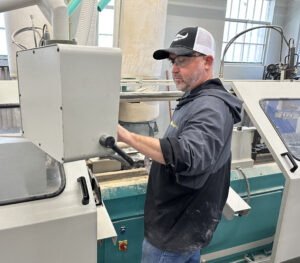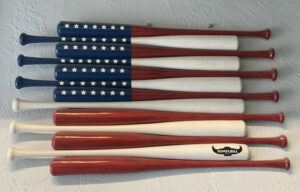
El Paso – When it comes to the game of baseball, there’s nothing like the smell of the grass and leather, or the sound of bat when it hits a ball or a ball hitting the back of the catcher’s mitt. Here in Texas, you can find some of the finest gloves in the game being made in Nacona. But you can also head out West to find bats being produced in El Paso, of all places.
Kurt Gross runs the Overfly bat manufacturing facility in El Paso. He only recently got into the bat business, while shopping for a bat for his son. “I actually met my business partner, Raul Salazar, when my son needed a bat and when he was just starting his career in high school,” said Gross. “So Raul was making Powerbull bats at the time, and so that was the very first Powerbull bat that I bought was for my son. Then it led to Raul and I becoming business partners in 2018, and then eventually getting our MLB license for the 2019 season.”

Powerbull bats had been in business in Mexico long before Gross became involved, and Salazar’s bat making know-how quickly meshed with Gross’s business prowess. “Raul’s vision was to bring it to the United States and to get our MLB license,” said Gross. “He wanted his bats used in Major League Baseball. He just didn’t have the business sense or know how to do it in the United States.”
The duo’s ability to produce high quality, MLB-ready bats quickly produced into opportunities with major and minor league teams, including the hometown El Paso Chihuahuas. “Being located here in El Paso, we do a lot of work with minor league players,” said Gross. “Obviously we have a great relationship with the El Paso Chihuahuas and the great team that they have there, but those minor league players that come through, not all of them will make it to Major League Baseball, but there’s a lot that will play professionally around the world.”
You may be asking yourself why Gross would decide to open up his bat business in El Paso, and his main reason is the same reason that many avoid the desert city. “El Paso’s a great place to make bats because it’s so dry,” said Gross. “A lot of bat manufacturers have a problem with humidity. They have to extract the moisture out of the air. There are times in El Paso where we have to bring moisture into the shop to maintain our moisture levels here, humidity levels in the shop.”
So the weather makes for great bat making conditions, but El Paso is also lacking in one seemingly important resource for wooden bat manufacturing; wood. “The number one question we get is ‘where do you get your wood?’” said Gross. “Because in El Paso there’s not that many trees. But all of our wood, and a little known secret in the bat business is that all of the bat manufacturers, with the exception of one, get either all their wood or the majority of their wood from the same mill we do in upstate New York, because that’s where it’s a cold, wet, damp winter, which makes a very dense, hard tree.”

Gross makes all the bats himself using a computer-controlled machine called a lathe. The lathe spins the bats at a rate of around 3000 revolutions per minute, and the machine can quickly and precisely shave down cylinders of wood called billets into a bat of any shape or size a player could want. “It goes from billet to bat in about 3 minutes,” said Gross. “Major League Baseball says that the minimum weight that you can use requirement is 88 ounces,” said Gross. “Anything under 88 ounces will be either a youth bat or a fungo for coaches. 88 to 89 ounces is the absolute sweet spot to make a major league bat.”
After handling so many bats during his time in El Paso, Gross is now able to recognize the smallest differences in bat sizes without any need for a machine. “It’s funny, you get to the point where you’re making bats, and I can just grab it and say that’s 24.2 or 22.3. I can be within a 10th of a millimeter, no doubt,” said Gross. “I can honestly say I’ve had my hands on every bat that’s been used at the major league level and to see the players and to know their stories behind the scenes and then have them use our bats at the highest level in Major League Baseball, hit home runs, win ball games, that kind of stuff is incredibly rewarding.”
Gross’ passion for making bats is fueled by his love of the game, and he feels a sense of pride that he’s able to help today’s players succeed on the biggest stage. “I mean, it’s just a cool feeling that we created something here that not just won ball games but made that player successful, made those fans cheer in the crowd and those kinds of things,” said Gross. “It’s a great feeling.”